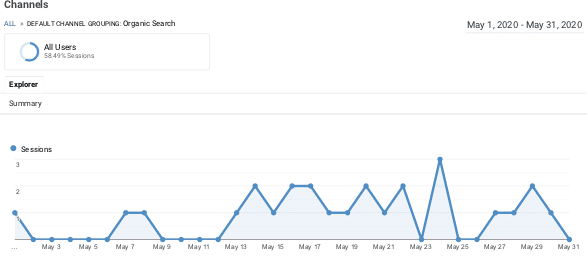


No.
Perhaps I should give you a little more information.
Every once in a while, I hear an SEO rumor that “if you do X, it will help your SEO.” The latest one I heard was that “adding posts to your Google Business listing will help your SEO.”
If you don’t know, let me explain what this is. If you log in to your Google Business account (aka your local listing, GMB profile) and view your specific business’s profile, you will see “Posts” in the left column. From there, you can add all sorts of posts to appear within your Knowledge Graph. Your Knowledge Graph appears when someone Googles your business name, and your business information (and map) appears in the right column of the search result.
For example, here’s mine: https://www.google.com/search?q=Reliable+Acorn+LLC&ludocid=17771292257137209487
From within your Google Business account, you can add posts that show up here. You can add special offers, events, or even products.
Some claim that posting updates here “helps your SEO”.
I really hate it when people claim something “helps your SEO“. That claim doesn’t mean much. I think people intend that it helps your website rank better. Well, that kinda makes sense. Playing with Google’s tools might reward you with a better ranking.
The problem: rank for what? Rank applies to a specific search query for a specific user with a specific search history at a specific time. Which of these factors does posting to Google Business help? For what phrase? How can you check this?
Maybe they mean that the link you think of, which you link from your Google Business page, ranks better.
To answer this question, I tried to gather some data. First, I posted links to new blog posts in my Google Business listing (well, not mine, but a client’s) over several months. To see what happened, I attempted to look at the traffic to those blog posts in Google Analytics. There wasn’t much traffic to these posts.
Perhaps they were ranking (showing up in the search results), but nobody happened to be searching for the topics, so ranking didn’t translate into visitors. As a result, there wasn’t traffic to report in Google Analytics. That might be true, but I wrote the blog posts in light of questions people were definitely searching for on Google.
Perhaps the ranking benefit wasn’t good enough because I wrote my articles poorly or didn’t truly “optimize” them for SEO? Perhaps I suck at SEO? Maybe, but some blog posts (written using the same process of identifying searched topics and writing a comprehensive overview of these topics) do very well for this client. In fact, they get more traffic from their long-tail searches (thanks to other blog posts) than from many of their core landing pages.
The real problem was that the data was cloudy. It’s hard to tell if something “helps your SEO” if we can’t see any effect.
So I switched my experiment and added Google’s UTM builder parameters to the URLs I used in Google Business posts. This way I can see when someone visits my site and from where they are coming:
?utm_source=google&utm_medium=organic&utm_campaign=MyBusiness
Adding this to the end of the URL will help distinguish “regular” organic traffic from Google against traffic from the My Business post. Just to be clear: I have set up canonical tags on these posts, so Google should treat the URLs with the UTM builder parameters the same as the ones without when it comes to appearing in the SERPs.
I then started posting to my clients Google Business page as posts twice a week for the month of May (2020). Here’s what happened:

Yup. That’s four visits (sessions) to only two articles for posting seven times over a month. By the way, there is no conversion from this traffic.
Let’s compare this against “normal” organic search traffic to these seven posts over the same time period:

Let that “SEO” roll on in!
In case you aren’t catching my sarcasm, posting these to Google Business did little to help.
Maybe this is incomplete data. It would be better to compare the performance of articles I didn’t publish on Google Business against those I did. However, the traffic is so small that I have to conclude it didn’t do much, if anything.
Or perhaps people think they’re building links to their site from the Google Business profile. While links are an important part of Google’s ranking algorithm, the fact is that these links wouldn’t count for SEO purposes. The best they can do is send traffic.
While it doesn’t seem to “help your SEO,” it doesn’t hurt anything, so why not? In fact, as people search for your brand name and find your Knowledge Graph, talking about your industry can help your branding by establishing your credibility.
And that’s really the biggest benefit for Google Business posts: the only place someone will see them is by viewing your business’s Knowledge Graph. The only way someone will see that is if they Google your company’s name. Only someone will do that if you’ve already built awareness.
SEO, however, is about connecting with customers, whether or not they’ve heard of your business before. SEO, at its best, helps people find your business because they’ve searched for the service you offer rather than because they already know your company. SEO introduces people to your business. Google Business posts don’t do that, but they can help establish your business as credible once they find it on Google.
It doesn’t take much time to add a post to Google Business. So you might as well do it. Don’t believe the hype about it being the next secret to SEO success.
Reliable Acorn will help you create a custom digital marketing strategy that does just that.
Ready to Talk?